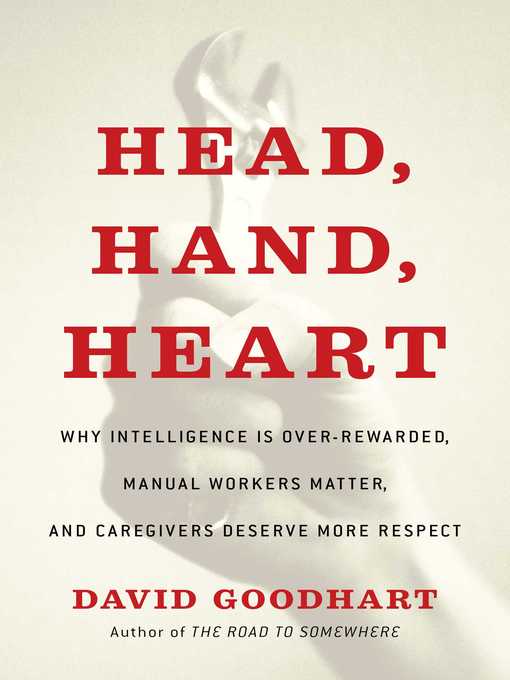
Head, Hand, Heart
Why Intelligence Is Over-Rewarded, Manual Workers Matter, and Caregivers Deserve More Respect
کتاب های مرتبط
- اطلاعات
- نقد و بررسی
- دیدگاه کاربران
نقد و بررسی

July 27, 2020
In this provocative and probing account, British journalist Goodhart (The Road to Somewhere) decries the rise of an entitled “cognitive class” at the expense of skilled and semiskilled laborers and caregivers. Though Western societies once rewarded artisans, farmers, and factory workers with decent pay and genuine respect, Goodhart writes, a college degree “has become the only route to respect and prestige,” even in occupations, such as policing and nursing, “with only high school graduate cognitive requirements.” The result, he contends, is increased social division and the perception among ordinary people that more educated lawmakers don’t really care what they want. Goodhart deplores “the destruction of union power” in the U.K. and U.S. since the 1980s, and the obscuring effect of “management-speak” and “politically motivated euphemisms.” He explains how the plain speaking of Donald Trump and Boris Johnson helped them forge bonds with common people, though he underplays the xenophobic undertones of their populist messaging. While the early chapters feel intentionally controversial, Goodhart transitions into a reasonable call for better pay for caregivers and teachers, and presents an appealing vision of a future in which “cognitive diversity” is the norm and the job market isn’t flooded with overqualified graduates. The result is a deeply felt and persuasive call for rethinking the social order. Agent: Susanna Lea.

August 1, 2020
How overlooked and underappreciated workforces are gaining significance and essentiality. In a book that offers an entertaining and educative amalgam of political and sociocultural insight, statistical data, and crisp opinion, the author digs deeply into the different capacities of human intelligence and how, in global societies, the perception of intellect has mutated into a hierarchical plateau with differing levels of status and influence. Following The Road to Somewhere, in which he explored political and moral identity in the era of Brexit and Donald Trump, British journalist Goodhart scrutinizes the contemporary workforce, dividing it into those who work with their hands (surgeon, artist), their heads, and their hearts (social care), and he argues that "today's American, British, and indeed European 'dreams' have become too narrowly defined as going to university and into a professional job." Throughout a narrative that highlights labor disparity trends and workplace sacrifices to technological innovation, the author effectively reveals how those with high analytical abilities are considered the "gold standard of human esteem" while skilled trade professions remain undervalued. Goodhart believes it's too early to know whether the pandemic will have a significant effect on these scales of meritocratic and income inequality, but he rightly celebrates the "care economy" and workers who operate within the critical heart-head-hand triumvirate. The author insists that the ultimate goal should be the achievement of balance and mutual respect, and he also offers a discussion of his own evolution "from a leftish journalist who saw politics mainly through the prism of utilitarian and economic motivations--and for whom data was key--to my growing sense, in the last decade or so, of people's need for meaning and recognition, and the power of emotion and storytelling, in our politics and daily lives." Featuring intersecting themes of wealth disparity and social and cultural perceptions of what constitutes a profession, Goodhart's study bestows much-needed attention on an important topic. A thoughtful, commanding analysis that applauds essential workers and cognitive diversity.
COPYRIGHT(2020) Kirkus Reviews, ALL RIGHTS RESERVED.

























دیدگاه کاربران